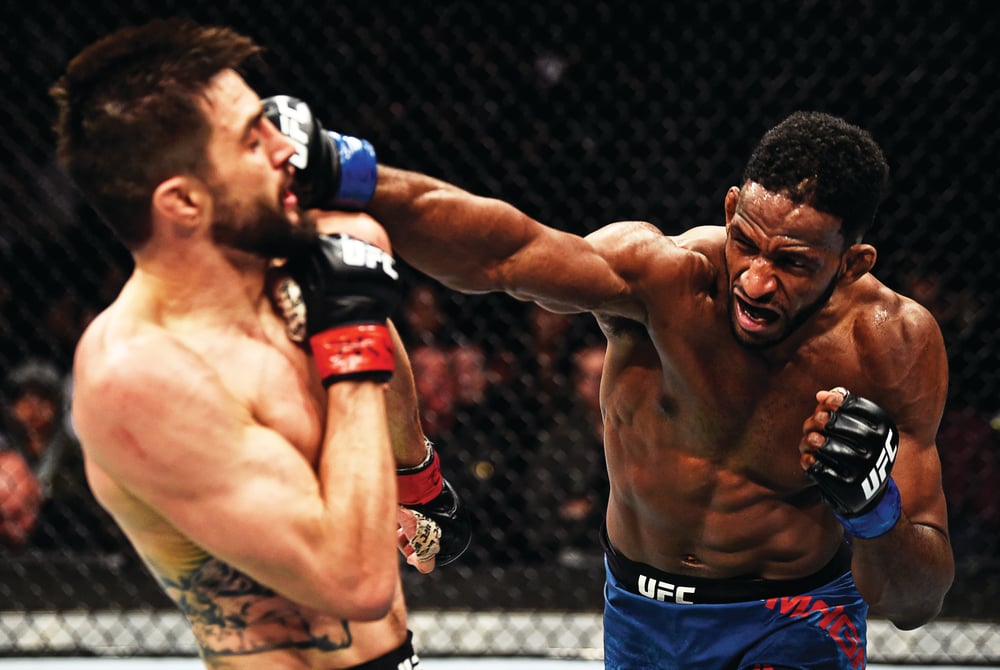
Issue 166
April 2018
How Neil Magny overcame injury to re-establish himself as a top UFC welterweight.
You’re usually such an active fighter, but injury kept you out of the cage for 10 months last year. How difficult was to be away from the gym?
That was really stressful for me, and to try to get back to what I was doing was tough. To go to the gym and not be able to move a 20lb dumbbell was disappointing and almost depressing. My injury just came out of nowhere and bothered me mentally for a bit.
What was the most trying part of that long layoff?
There were times where I would go to the gym and try to carry on with the physical therapy and get back to strength training. To physically not be able to do something I knew I could do in the past literally brought me to the point of tears.
I was angry. Why can’t I do this? I wondered why my body wasn’t responding the way I wanted it to. Why am I in this position? I have taken care of myself, how can this happen now? It was hard for a bit. It sucked to be in that position. I wanted to get back to fighting and enjoying life.
How did the UFC help to support you while you were away from the cage and rehabilitating?
It was great. I didn’t feel any pressure at all to get healthy or make a rash decision to have surgery. As soon as I mentioned to them I was injured, they did the best they could to get the medical team in contact with me in order to get my treatment covered under the insurance.
Sean Shelby told me to take my time and get healthy and, when I was healthy, to reach out to him and we would start looking for a fight. I really appreciated the company not putting any pressure on me. It was great knowing that they had my back and were looking after my interests.

Now that you’re healthy, how do you stay sharp and continue to improve in all areas of mixed martial arts?
We try to focus on developing every skill set at least three or four times a week. One of the things that has allowed me to be successful in the sport is training across the board with all kinds of skill sets.
I don’t want the only time I am training stand-up to be when I am preparing to fight a stand-up guy. I should have already had that skill set built and already be working on that. Once I get the call to fight a striker, we will deal with that. I just try to make sure I am growing as a martial artist across the board, not just one particular area.
My goal is to get at least three or four days a week in on each skill set and put it all together when it counts.
You are a mainstay at Elevation Fight Team. Who do you mix it up with most in the gym?
One thing I have done more to help my ground game is to put the gi on. It forces me to go outside my comfort zone. I can get away with sloppy technique and get out of bad positions just because of how explosive or how slippery I am but in the gi you have to use technique.
I put myself in an uncomfortable position and I have to focus on technique. If I can put myself in bad positions and not get submitted and improve position then it reinforces my confidence and ability when I’m not in a gi. These guys I’m rolling with are world-level competitors. They aren’t training other disciplines. They are only training BJJ.
Who do you work with for strength and conditioning?
One of the things that helped my performance get a lot better in the weight room and cardio is relying on a guy who specializes in sports performance rather than just a strength and conditioning coach. I train with Loren Landow from Landow Performance. He’s not necessarily giving me something that looks cool or gets me in shape, but something that gets me to a higher level as an athlete.
He has me working on explosiveness and footwork, which makes me an all-around better athlete. Once I am put in a position to go out there and perform, I am able to do so because I am an all-round better athlete.
...









